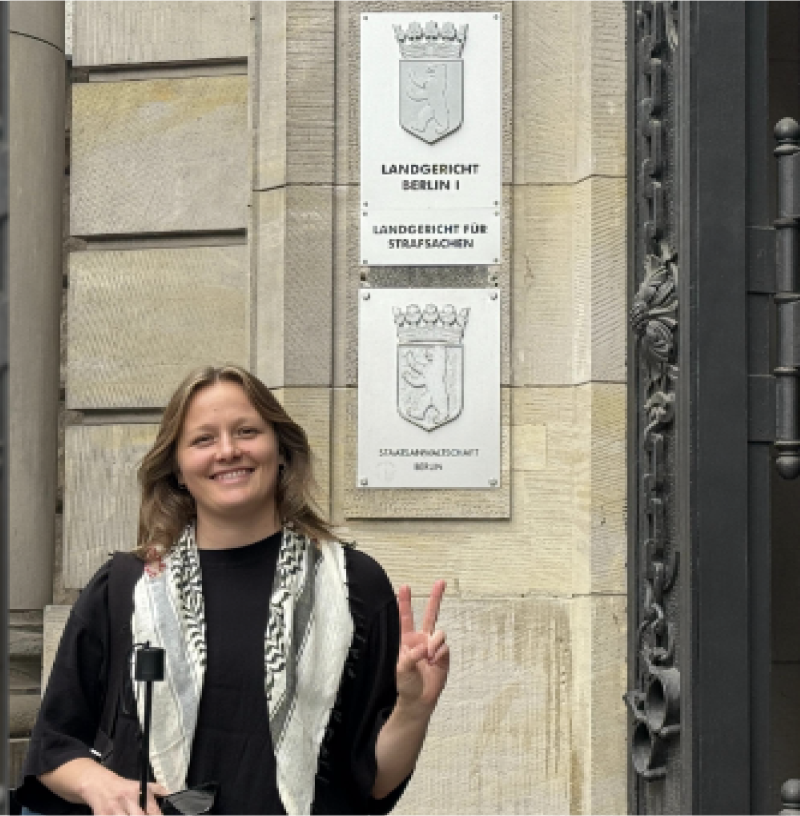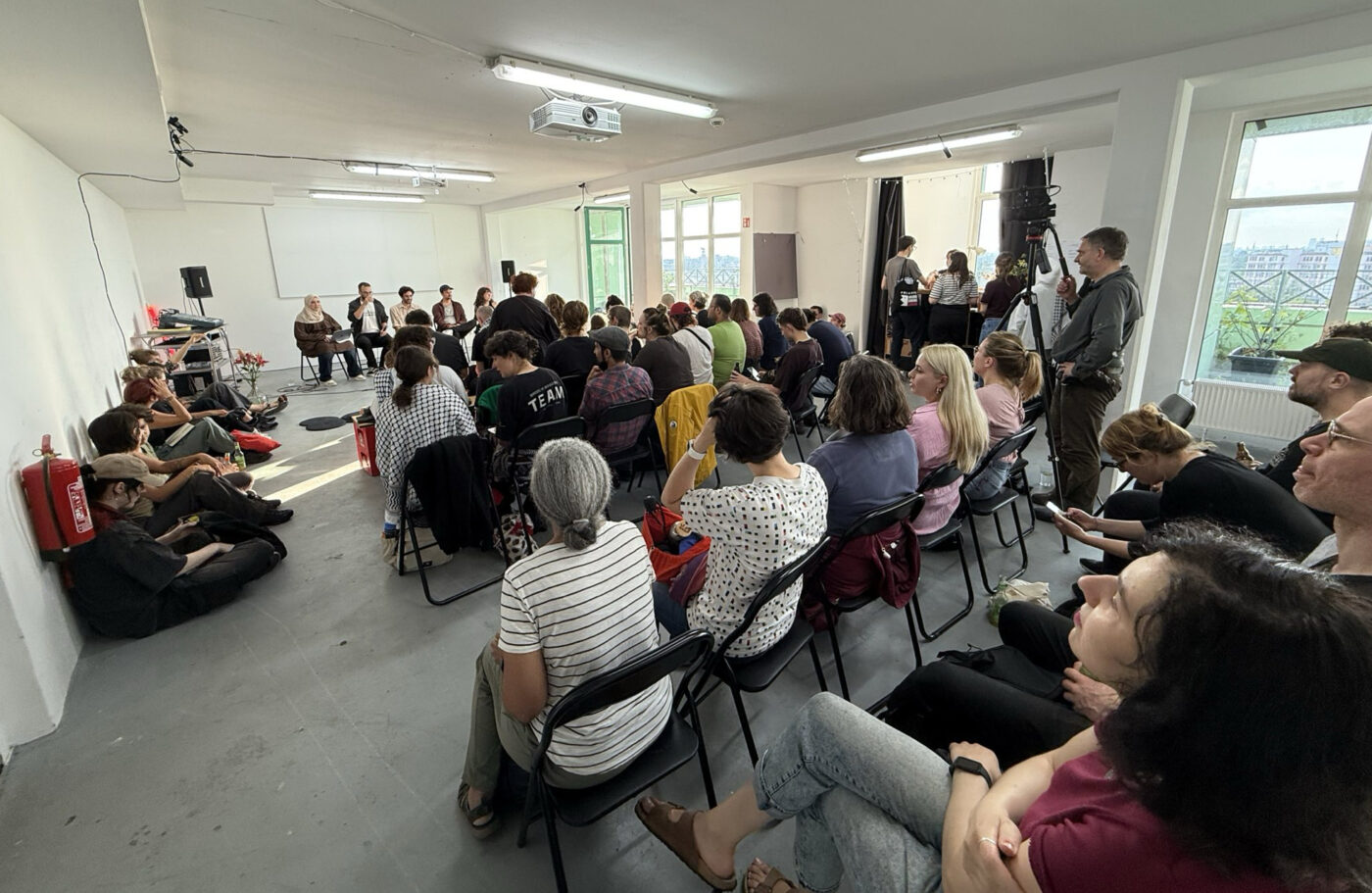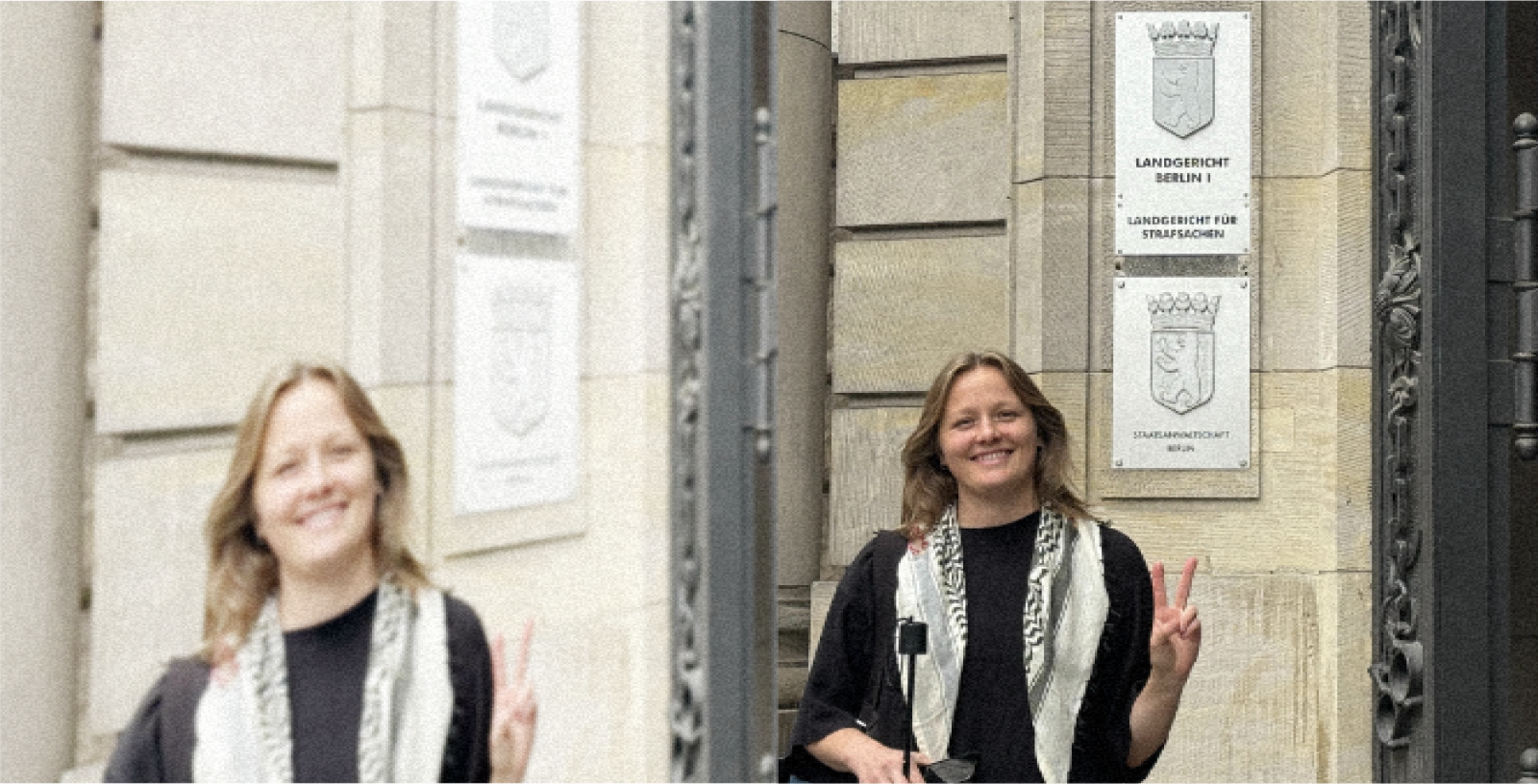Rebekka Shapiro, a “hübsch1” Norwegian woman who lives and works in Berlin, was recently in a Berlin criminal courtroom defending herself against a charge of assaulting a police officer. The alleged offense occurred at a sit-in demonstration in front of the Axel Springer building to protest German complicity in Israel’s on-going Palestinian genocide. The Axel Springer publishing empire is famous for being a staunch supporter of Israel. Springer employees are required to sign a pledge to support Israel in order to gain employment 2. The demonstration took place more than 18 months ago, but the trial, and the possible verdict, have been a constant source of anxiety for Shapiro and her wife, Rachael Shapiro, who faces her own trial for alleged police assault at the same demonstration.

The law is clear in such matters. At trial, the alleged victim is asked to recall and describe the event as best they can. In this case, however, the police officer couldn’t remember anything. This is where the trial got interesting. Instead of dismissing the case, which often happens in such instances, this judge called up the officer’s account written the day after the demonstration. The courtroom, and the ten or so citizens in attendance, were then witness to the judge reading directly from the officer’s report. The officer barely spoke at all, and when he did, it was usually a simple “ja”.
The defense attorney, Alexander Gorski, looked exasperated as he repeatedly interrupted the judge to have him explain the propriety of a judge working this way. The judge appeared to be doing the job of the prosecuting attorney who sat silent through most of the trial. The absurdity of the scene grew when both the judge and Gorski determined amongst themselves the wording of the policeman’s answer which was to be inserted into the trial protocol while the policeman looked on, obviously bored. The legal farce reached its apex when the judge read part of Shapiro’s statement to the policeman.
Shapiro said she acted in self-defense (if not, then she assaulted the officer’s hands with her neck in an attempt to stop herself from breathing). The officer replied that it is possible that she could have been acting in self-defense. The judge, taken aback, quickly tried to get him to revise his answer. Apparently the possibility of a young woman acting in self-defense is not something the judge wanted to hear.
After three hours, the judge wanted to read the policeman’s earlier report into the record to which Gorski strenuously objected since it had nothing to do with the officer’s current recollection. Running out of time to debate this, the court adjourned for the day and the trial will continue in August.
Gorski is a member of European Legal Support Centre (ELSC), a group “dedicated to protecting the fundamental rights to freedom of expression and assembly of those who speak out and take peaceful action in Europe for justice and freedom of the Palestinian people” 3. As a result of the increasing number of arrests made by Berlin police (more than 50 demonstrators were arrested at the Nakba77 demonstration on May 15 alone), he and the others in the Berlin chapter of ELSC are overwhelmed with cases.
German police are known for their brutality. Despite the rapidly growing number of allegations of police violence, Amnesty International reported in 2024 that “an overall lack of effective independent complaints mechanisms and lack of mandatory identification badges for police at federal and state levels [continue] to hamper investigations into allegations of abuses.” 4
Berlin is widely considered to be the epicenter of German police brutality with 784 complaints registered in 2024. This marks an 83% increase in year-over-year registered complaints from 2023. 5 The credibility of Berlin’s police force has also been called into question when a police officer was assaulted during the aforementioned Nakba77 demonstration. Video recently emerged that shows the officer’s hand was not injured by a protestor’s assault, as reported by the police, but by the cop himself hitting protestors a little too enthusiastically. 6
Gorski and his group are currently strategizing to determine how to best prioritize cases in order to have the greatest political impact. This means that they will suffer lower court defeats in order to take cases of precedent to higher, federal, courts.

As part of the strategizing work, a panel discussion was recently organized in Berlin by the International Jewish Antizionist Network (IJAN). Called “Combatting Zionism In and Beyond the Courtroom”, the panel consisted of Gorski (with other lawyers from ELSC in attendance) as well as the British anti-zionist Jewish lawyer Oscar Leyens and noted Irish Barrister Franck Magennis. The panel discussion was moderated by Palestinian journalist Hebh Jamal. Due to state repression, the organizers were concerned not only about whether or not the police would shut down the event, but even if Magennis would be allowed to enter the country. The Deutsch-Israelische Society, Rhein-Neckar, Mannheim demanded the “Hamas Lawyer” be denied entry to Germany (gein Home Secretary to have Hamas removed from the list of proscribed organizations under the Terrorism Act 2000).
In the meantime, Rebekka awaits her verdict. As she wrote in her statement to the court, “If the German state decides to convict me and make me pay for being attacked by a police officer, that is nothing compared to the horrors our brothers and sisters are suffering in Palestine.” That part was not read out loud by the judge.
- As described by the arresting officer while making his report.
- https://jewishinsider.com/2024/03/politico-axel-springer-publishing-israel-berlin-d-c/
- https://www.bacbi.be/pdf/ELSC.pdf
- https://www.amnesty.org/en/location/europe-and-central-asia/western-central-and-south-eastern-europe/germany/report-germany/
- https://www.berlin.de/en/news/9715168-5559700-784-complaints-to-the-ombudsman-and-poli.en.html
- https://maktoobmedia.com/gaza-genocide/report-accuses-berlin-police-of-excessive-force-at-nakba-day-protest-spreading-misinformation/
 NO
NO